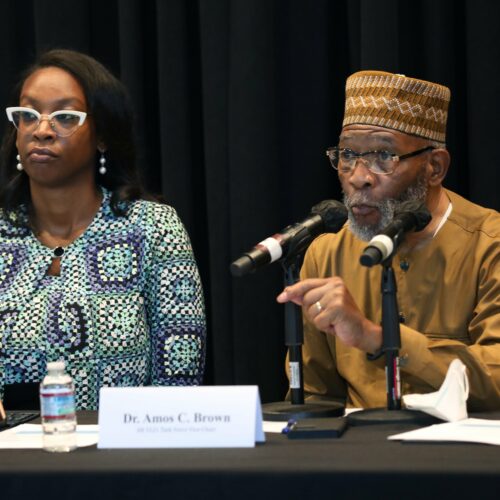NEW YORK — An exiled Chinese tycoon indicted in New York earlier this month in a billion-dollar fraud case controls the conservative social media platform Gettr and used it to promote cryptocurrencies and propaganda, former employees have told The Washington Post.
Gettr doled out tens of thousands of dollars to right-wing figures including Trump adviser Stephen K. Bannon, sent money to contractors affiliated with Guo, and altered information on Gettr users that law enforcement agencies had sought, according to the former employees and internal company documents obtained by The Post.
The revelations show that a man accused of massive fraud on two continents climbed high into Trump’s political sphere and dictated messaging at a social media site that reaches millions of Americans.
Guo was arrested March 15 at his Fifth Avenue penthouse in New York, where a fire broke out as agents hunted for documents. Je, who lives in London, remains at large.
Federal prosecutors in Manhattan have charged both men with 11 counts of securities and wire fraud, money laundering and related offenses and Je with an additional count of obstruction. The legal documents do not allege any wrongdoing at Gettr; prosecutors did not return a call seeking comment Friday.
Guo was known to have been a Gettr investor, but his dominant financing role and ability to influence hiring and content decisions at the platform have not previously been reported.
Miller has said previously that Guo invested in Gettr indirectly through a family foundation and that an international fund was another part-owner. But two former Gettr employees told The Post that Miller told them that the international fund was Hamilton Investment Management, where Je is founder and chief executive.
Miller “publicly mentioned an international investment fund. To me, he specified the name Hamilton Investments,” Ben Badejo, Gettr’s former director of trust and safety, said in an interview.
The second former employee, speaking on the condition of anonymity to avoid retaliation, said that they had asked Miller about Guo’s backing before joining the company and that Miller misled them by saying Guo had an indirect, minority stake. They said that after they had been working there for a time, Miller said another significant investor was Hamilton.
“He had this line, ‘Gettr is backed by an international consortium of investors.’ It was very clear it was not true. I don’t think there was any other investor. I would have known,” this person said.
Now claiming nearly 7.5 million users, Gettr was among the conservative alternatives to Twitter, along with Trump’s own Truth Social, that sprang up after the major platforms banned Trump’s accounts following the Jan. 6, 2021, attack on the U.S. Capitol. Gettr had 3.1 million page visits in January, down from 5.4 million in November, according to SimilarWeb. The same period saw Truth Social fall to 5.7 million from 8.3 million.
Miller declined to answer questions about Gettr and its financing, referring questions to the company’s chief financial officer, Robin Mokhtar, who did not respond to a phone call and email seeking comment. Gettr did not reply to an email sent to its public relations department.
Attorneys for Guo did not respond to a request for comment and have given no statement in court or in public since the indictment. Je spokesman Richard Merrin declined to answer questions about Gettr, saying only: “Mr. Je is deeply disappointed to learn of the actions by the United States Department of Justice and Securities and Exchange Commission initiated last week. Mr. Je vehemently denies all the allegations in these actions.”
According to the recent indictment and the Securities and Exchange Commission, Guo duped thousands of his followers into investing in private stock sales of his companies or cryptocurrencies, then spent much of the money on himself, including $40 million on a New Jersey mansion, nearly $1 million on rugs and $53,000 on a fireplace log holder. Though the filings focus on Guo’s other networks, Guo also promoted digital currencies via Twitter and live streams on Gettr.
Federal agents seized more than $300 million in bank accounts marked Hamilton Opportunity Fund or Hamilton Opportunity Funds in a forfeiture proceeding. They also took another $2.7 million from an account marked Gettr USA, without saying who controlled it, court documents show.
Gettr played up its Americanness from the beginning, launching on Independence Day. The site declares that it “champions free speech, rejects cancel-culture, and provides a best-in-class technology platform for the marketplace of ideas.”
Internally, it prioritized U.S. politics, according to an undated internal spreadsheet that tracked how much it paid influencers to post on its network and attract new users.
Over varying periods ending as late as December 2022, Bannon’s War Room podcast received $50,000, according to a screenshot of the spreadsheet Badejo gave to The Post. It was the largest sum of 18 payment streams listed. Bannon did not respond to requests for comment.
Turning Point USA leader Charlie Kirk’s Resolute Media received $18,000, according to the document. About $15,000 each went to firms marked as connected to well-known conservative commentators Dinesh D’Souza and Jack Posobiec and to British rightist Tommy Robinson, the document said. Smaller amounts went to the podcasting duo of Lynette Hardaway and Rochelle Richardson, known as Diamond and Silk, and to activist Andy Ngo. Kirk, D’Souza, Posobiec, Richardson and Ngo did not respond to requests for comment. Robinson could not be reached.
The former employees said they were unnerved that the money for Gettr came from a foreigner, especially because some exiles have accused Guo of being a double agent for the Chinese government working at co-opting opposition, noting that he was close to high officials before leaving.
“It’s really kind of scary how a Chinese billionaire can create this,” the second former staffer said. “It’s important that this is talked about as a potential national security issue.”
Also known as Miles Guo, Miles Kwok and Brother Seven, Guo made a fortune in mainland China real estate development before coming under government scrutiny there and fleeing to the United States ahead of fraud and bribery charges. Since then, he has positioned himself as a leading foe of the ruling Chinese Communist Party, amassing hundreds of thousands of followers on various platforms, including his own. Guo’s networks have also promoted Trump, QAnon conspiracy theories and false claims about coronavirus vaccines and treatments, The Post has reported.
“The network stands out for its cross-platform coordination, breadth of technological sophistication, ideological alignment, and sheer output of high-quality content,” said disinformation analyst Kyle Weiss of Graphika, which tracks propaganda networks for social media companies. He said Guo sets the messaging, which is amplified by affiliated media outlets such as GNews and GTV and then followers coordinating on Discord, GitHub and elsewhere using thousands of social media accounts.
In 2021, Graphika reported that Guo had pushed people to attend the Jan. 6 rally, using the #StoptheSteal hashtag. When the attack failed, Guo switched to amplifying claims that the violence that day had been the work of antifa infiltrators, Graphika said.
Guo also has encouraged followers to protest in person against other Chinese expatriates, including other anti-Communists he sees as rivals, and even court officials who have ruled against him.
Guo formed a close alliance with former Trump adviser Bannon; Bannon was arrested on Guo’s family yacht in 2020 on fraud charges. He was pardoned by Trump.
At Gettr, Guo’s influence extended beyond financial matters to hiring, relationships with other businesses and content decisions, the former employees said. Badejo, who describes himself as a conservative, provided internal emails, instant messages and other documents to back up his claims.
Gettr is based on the 20th floor of 3 Columbus Circle in New York. The same floor houses Guo operations including G Clubs, which prosecutors said was used in the alleged money laundering. Still other Guo operations worked on contract for Gettr or shared resources, and some engineers who worked at Gettr maintained their email addresses at a domain designated “GCoders,” which also served other Guo entities, Badejo said.
Many on the Gettr staff were Guo acolytes, the two people said. Guo’s presence on the Gettr side of the floor became more frequent toward the end of last year, when he would walk through the Gettr section and post live streams of himself discussing various topics, the second former employee said.
“He would use the same room as Jason,” the second person said, and promote various coins and the New Federal State of China, a purported rival government in exile created by Guo and Bannon.
“They would roll out the NFSC backdrop and roll in the Gettr backdrop,” they said. “We were all waiting for journalists to figure out what was going on.”
One woman who spent most of her time on Guo’s side of the floor, Yvette Wang, was also his representative on the Gettr board, both former employees said. They named two other people on the board who work for HCHK Technologies, which Google lists as the developer of Guo’s GNews app.
The second employee said they understood the corporate structure to be that Miller reported to the board, which in turn reported to Guo and Je. Wang could not be reached for comment. A lawyer for another Guo company handled some of Gettr’s legal issues.
The overlaps made some employees uncomfortable.
A contractor named Orbit did some content moderation and was especially keen to delete anything critical of Guo, the two said.
A customer support contractor called Oasis Tech, meanwhile, had ties to Guo that made Badejo and others cautious. One of two listed shareholders of Oasis under its former name of Seven Stars Media, Xuebing Wang, was also listed as the director for GFashion New Zealand, a Guo company.
After it submitted a monthly invoice for $400,000 with the single line “engineering contractor service,” Chief Financial Officer Mokhtar pushed back.
According to an email Badejo shared with The Post, Mokhtar wrote colleagues: “We would like for them to include additional details on their monthly invoice such [as] number, location, name, project, hours etc. of the engineers performing the work. Current invoices, June attached, does not provide enough detail which will definitely be an audit issue.”
Whether the invoice was revised or paid is not known. No one at Oasis returned a voice mail left at the phone number listed on the company’s website, and Mokhtar did not respond to attempts to contact him.
Though Gettr’s funding sources remained opaque to most employees, Miller and other executives were deferential to Guo’s representatives and concerned about his opinions, the ex-employees said.
In an alarmed WhatsApp group chat that showed Truth Social’s beta version had direct messages before Gettr, Miller told staffers: “Not for sharing, especially not with Miles.”
Guo stepped more visibly into Gettr affairs this year, when he began pitching the availability of Gettr Coin, with which Gettr users are supposed to reward other users, the second former employee said. In videos posted to Twitter, Guo touted an early sale of the coins for 10 cents each and discussed them with Ken Huang, Gettr’s chief technology officer.
A disclaimer on Gettr’s site says they have no value and can’t be used outside of the platform.
Badejo said he left Gettr in September because of another issue: his belief that Gettr was not providing accurate information to law enforcement about its users.
Gettr sometimes received subpoenas for information about users, including the email addresses with which they had registered accounts and the IP addresses of the computers they had used. Those included a ransomware operator and a user who had posted that he would kill “Judas” former vice president Mike Pence if he got a chance, according to copies of subpoenas Gettr received and those users’ posts on Gettr.
Badejo’s job included responding to those legal demands, which required him to attest that they were truthful and complete under penalty of perjury.
But he said he discovered that the company had been answering such requests by providing altered IP addresses in which the final sequence of numbers had been replaced with the number zero.
Badejo told Miller and Huang that the practice was putting everyone involved in legal peril.
In a March 2022 Microsoft Teams chat preserved by Badejo, Huang told him that “we have an IP scrubbing job that convert (sic) the 4th octet into 0.” He said an upcoming release of the product would preserve the real numbers. But Badejo found messages on other topics that included full IP addresses, which made him nervous.
In an email to a Gettr lawyer, Badejo wrote: “Ken and others in engineering initially said we don’t ‘collect’ full IP addresses, then eventually slipped and said we ‘remove’ it (after I had submitted DOJ information).” Huang and the lawyer did not respond to emails from The Post seeking comment.
As Badejo added a disclaimer to new responses, he suggested that they warn enforcement offices around the country that the past submissions had incomplete addresses.
Executives never went back and corrected the old responses or told officials of the issue, Badejo said. He eventually told the FBI about the matter, and he said agents have interviewed him twice since then. The FBI declined to comment on the IP addresses or whether it was looking more closely at Guo’s activities at Gettr.
“There was an opportunity to do the right thing, help the Department of Justice and avoid criminal proceedings,” Badejo said. “And they just didn’t.”





